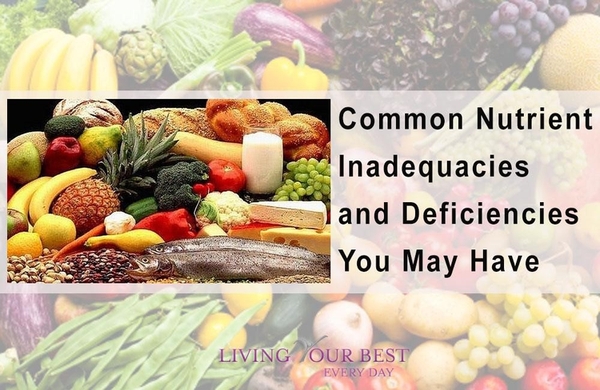The body requires many different vitamins and minerals (often referred as micronutrients) that are crucial for both development and preventing disease. They aren’t produced naturally in the body, so you have to get them from your diet. The amount of each nutrient you should consume depends on your age. In the United States, many foods that you buy in the grocery store (such as cereals, bread, and milk) are fortified with nutrients that are necessary to prevent nutritional deficiency. But sometimes your body is unable to absorb certain nutrients even if you are consuming them.

A nutritional deficiency occurs when the body doesn’t absorb the necessary amount of a nutrient. Deficiencies can lead to a variety of health problems. These can include problems of digestion, skin problems, stunted or defective bone growth, and even dementia.
Let’s see some of the nutrients, with their role for the body and best sources to get them.
| Nutrient | It’s rolle | Symptoms | Best sources |
|---|---|---|---|
| Iron | Without enough iron, your body can't produce enough of a substance in red blood cells that enables them to carry oxygen (hemoglobin). As a result, iron deficiency anemia may leave you tired and short of breath. If you aren't consuming enough iron, or if you're losing too much iron, your body can't produce enough hemoglobin, and iron deficiency anemia will eventually develop. |
|
|
| Vitamin D | Vitamin D deficiency - when the level of vitamin D in your body is too low - can cause your bones to become thin, brittle or misshapen. Also helps the body use calcium from the diet. Vitamin D also appears to play a role in insulin resistance, high blood pressure and immune function - and how this relates to heart disease and cancer - but this is still being investigated. |
|
|
| Calcium | Calcium is probably best known for strengthening bones and teeth. Calcium also helps maintain heart rhythm, muscle function, and more. It's an ingredient in many antacids. Doctors also use calcium to control high levels of magnesium, phosphorus, and potassium in the blood. There's good evidence that calcium can help prevent or control high blood pressure. It also may reduce PMS symptoms as well as play a role in preventing certain cancers. Calcium also has been looked at for other uses, for example, aiding weight loss. |
|
|
| Vitamin B6 | Helps the body turn food into energy. It can also help the body fight infections. Pregnant and breastfeeding women need it to help their babies’ brains develop normally. Insufficient amounts of B6 can result in anemia as well as skin disorders, such as a rash or cracks around the mouth. A lack of B6 also can cause depression, confusion, or a susceptibility to infections. |
|
|
| Vitamin B12 | Vitamin B12 helps regulate the nervous system. It also plays a role in growth and red blood cell formation. Psychological problems such as dementia, paranoia, depression, and behavioral problems can result from a vitamin B12 deficiency. |
|
|
| Vitamins B1 and B2 | Vitamin B1 is also called thiamin. Vitamin B2 is also called riboflavin. These vitamins also help convert food into energy. Vitamin B1 has neurological benefits, and vitamin B2 helps maintain proper eyesight. |
|
|
| Vitamin B9 | Vitamin B9 is also called folic acid. Like most B vitamins, it fosters the growth of red blood cells. But it also reduces the risk of birth defects. |
|
|
| Vitamin A | Vitamin A is a group of nutrients that is crucial for eye health and functioning and reproductive health in men and women. It also plays a part in strengthening the immune system against infections. According to the WHO, a lack of vitamin A is the leading cause of preventable blindness in children. Pregnant women who are deficient in vitamin A have higher maternal mortality rates as well. |
|
|
| Magnesium | Magnesium plays a role in your body's detoxification processes and therefore is important for minimizing damage
from environmental chemicals, heavy metals, and other toxins. Even glutathione, considered by many to be your body's most powerful antioxidant,
requires magnesium in order to be produced. Magnesium also plays roles in preventing migraine headaches, cardiovascular disease (including high blood pressure, heart attacks, and strokes), sudden cardiac death, and even reduces death from all causes. |
|
|
To stay healthy, most people don’t need to take a supplement in order to get enough nutrients. There are plenty of delicious foods available to get all the nutrients you need naturally, as long as you maintain a complete diet of meats, grains, fruits and vegetables.
The federal government’s Dietary Guidelines for Americans recommends that you get most of your nutrients from food. In case, you may need to take supplements or a multivitamin to help your body absorb the supplements you should talk to your doctor, because the frequency and dosage of a supplement will depend on how severe the deficiency is. This will be decided ONLY by your doctor or a dietitian.
Eat a balanced, whole-food diet to prevent nutrients deficiency!
Resources:
www.healthline.com/health/
www.healthline.com/health/malnutrition#Types2
www.healthline.com/health/calcium-deficiency-disease
www.webmd.com/diet/guide/vitamin-d-deficiency

If you already have an account, please LOGIN.
If not, you may consider creating on. It’s FREE!